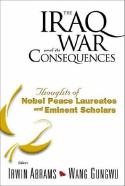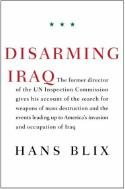Issue Date: May 21, 2004
Reviewed by FRANCIS DEBLAUWE The Iraq War and Its Consequences offers an interesting mix of articles short and long, brief and thorough, from big names and lesser-known authors, written shortly before or after the 2003 Iraq war. It goes without saying that it is therefore uneven in quality. Some articles were rushed to print, as is evident in some typesetting errors. Disarming Iraq, on the other hand, is a coherent, well-written story of the author’s efforts from 1991 until early 2003, as head of the International Atomic Energy Agency and then the U.N. Monitoring, Verification and Inspection Commission (UNMOVIC), to get to the bottom of Iraq’s programs of weapons of mass destruction. But let’s start with The Iraq War and Its Consequences’ first contributor. Tenzin Gyatso, 14th Dalai Lama of Tibet, invokes Mahatma Gandhi’s statement: “Violence inevitably leads to more violence; therefore if we are seriously interested in peace, it must be achieved through peaceful and nonviolent means.” Another man of the cloth, Gunnar Stålsett, bishop of Oslo, delivers the final thoughts. In his sermon for the many victims of the August 2003 bomb attack on the U.N. headquarters in Baghdad, he calls it “an act of violence against the divine and the human.” It is “an attack against the only institution that is capable of bringing peace to the troubled world -- if only it is allowed to do so.” It is fair to say that these two men set the overall tone of the book: generally antiwar but constructive and hopeful against all odds in the aftermath. “We must never let despair become the final response to the ambiguities of history,” writes Stålsett. Only a few authors are included who categorically supported going to war against Iraq in March 2003: former Nobel Peace laureates David Trimble, member of the British Parliament for Northern Ireland; José Ramos-Horta, foreign minister of East Timor; and Colin Renfrew, a professor of archaeology at Cambridge University. Like the political parties they belong to, Ulster Unionist Trimble and Tory peer Lord Renfrew basically fall in line with Tony Blair’s reasoning for war. Renfrew does express “a sense of shame that [the British] government and its allies in the coalition failed to prevent so predictable a catastrophe,” for example, the looting of the National Museum in Baghdad and archaeological sites throughout Iraq. Ramos-Horta portrays the United States as a mostly positive force in the post-Cold War world today that at most needs some gentle prodding toward more multilateralism. Interestingly, he does not address the decades-long occupation of his country by Indonesia that was only halted when the United States eventually withdrew its tacit support from the Indonesian military’s reign of terror. Overall, many nuanced insights can be gleaned from the 37 essays, speeches, letters and the odd interview. One of the more substantial pieces is by Jody Williams, Nobel Peace laureate and founding coordinator of the International Campaign to Ban Landmines. She methodically dissects how the Bush administration “used the [Sept. 11] attacks to put forth a national security policy of preemptive self-defense as if it were a direct response. … Instead, it is but one element of a vision of … unrivaled U.S. power … released in September 2002 as the ‘National Security Strategy of the [USA].’ ” This new security policy was then used to justify invading Iraq and “pave the way for a ‘reverse domino theory’ of radical transformation of the Middle East,” Williams argues. The U.S. media were instrumental in squelching antiwar dissent by creating an unquestioning “patriotic” climate. For instance, according to a study by Fairness & Accuracy In Reporting, in March 2003 just 3 percent of U.S. media sources represented or expressed opposition to the war. Nobel Peace laureate Bernard Lown, cofounder of International Physicians for the Prevention of Nuclear War, explains that the Pentagon lowered the nuclear thresholds exceptions not only by doing away with the 1970 pledge never to use nuclear weapons against a non-nuclear state but also by lumping nuclear weapons with the far less destructive chemical and biological weapons in the weapons of mass destruction concept, engendering equivalence in the public mind and numbing moral restraint against resorting to genocidal weapons. Most contributors agree with Mary Ellen McNish of the American Friends Service Committee that “lasting peace depends on the hard and proactive work of prevention.” All the more important it is, then, to remember that hawks like Donald Rumsfeld first began waging a “war on terror” and quest for U.S. hegemony about 20 years ago under Reagan, as skillfully exposed by Massachusetts Institute of Technology professor Noam Chomsky. Then the focus was Central America, especially Nicaragua, and the Middle East. Remember the photo of Rumsfeld, then special envoy to the Middle East, shaking hands with Saddam Hussein in Baghdad? Iraq then was the United States’ tool against Iran. The Iraq War and Its Consequences contains a quasi-universal condemnation of the Bush administration’s disdain for multilateralism; the latter has been replaced by what Harvard University professor Lisa L. Martin calls “ad hoc” or “opportunistic multilateralism,” for example, the “coalition of the willing” concept. Interestingly, Hans Blix describes in detail in Disarming Iraq how the United States ended up trying to use the United Nations and its inspectors as a “multilateral cover” for their regime change and war plans. In the end, though, the United States claimed it did not need the consent of the majority of the U.N. Security Council to start a war against Iraq for not abiding by the council’s resolutions. “There [was] something strange about the argument that the authority of the Security Council could be upheld by a minority of states in the council ignoring the views of the majority.” Reading Disarming Iraq, one gets an impression of Blix as the consummate bureaucrat and diplomat -- a true Swede. While he too believed the Iraqis were still hiding something, he espoused a skeptical but fair and constructive attitude throughout his work concerning Iraq weapons of mass destruction inspections both as head of the International Atomic Energy Commission and UNMOVIC: “I said Iraq tended to look at inspection as a penalty which it wanted to minimize. It should rather see inspection as an opportunity to maximize. The world would not believe what Iraq said, but it would believe the commission. Cooperation with us gave them an opportunity.” Blix’s book is a detailed chronicle of his career inspecting Iraq since the 1991 Gulf War. He sprinkles a few telling anecdotes throughout his otherwise fact-laden story. For example, at a Nov. 19, 2002, press meeting in Baghdad, he writes, “When asked about the declaration and the difficulties Iraq might have in reporting about so many types of items over such long periods, I said that ‘producing mustard gas is not like producing marmalade. You keep track of how much you make and what happens to it.’ ” During an inspection in the Al Sajud Palace about a week later, he remarks, “There were no archives, document files or stores of chemical or biological weapons and no sensitive equipment to tag, but there was lots of marmalade in the refrigerators.” Blix takes care to set the record straight regarding many unsubstantiated or false claims or allegations propagated by elements in the Bush administration. Remember the notorious aluminum tubes supposedly related to the manufacture of centrifuges used to enrich uranium for weapons? “The postwar experts in Baghdad had discarded [the centrifuge theory] and no longer showed any interest in the tubes. One expert volunteered the view that they might be looted to be used as drainpipes.” Notwithstanding increasing animosity coming from certain circles in the U.S. government, Blix states clearly that “whether the result of a joint consideration or of personal choice, public statements by Colin Powell, Condoleezza Rice and Ambassador John Negroponte about the inspectors’ positions were mostly restrained and all contacts perfectly civil.” He does express deep disappointment in David Kay, who started working for him as a highly valued IAEA inspector but then became one of his most persistent and harshest critics. Ironically, while in charge of the Iraq Survey Group after the 2003 Iraq War, Kay ultimately did the decent thing and admitted that there were no weapons of mass destruction to be found in Iraq. In light of the ongoing events in Iraq, it is becoming increasingly clear that the 2003 Iraq war was started for the wrong reasons, at the wrong time and by an administration obfuscating its true intentions to the general public. It is now also abundantly clear that the internal struggles, ideological shortsightedness, lack of preparation for the aftermath and general intellectual laziness of the Bush administration were and are still being paid for dearly in Iraqi, American and others’ blood. As the Flemish saying goes: Nooit brengt een oorlog vrede -- that is, wars never bring peace. These two books, particularly Blix’s, offer valuable information about the workings of international diplomacy and the peaceful alternatives to war that were squandered by the U.S. government. Francis Deblauwe has taught the history of the Middle East and manages the 2003 Iraq War and Archaeology Web site, cctr.umkc.edu/user/fdeblauwe/iraq.html. National Catholic Reporter, May 21, 2004 |

